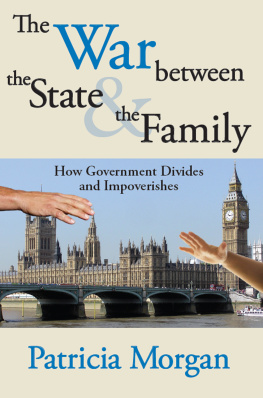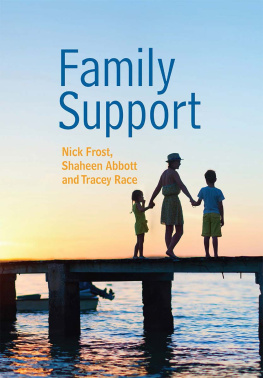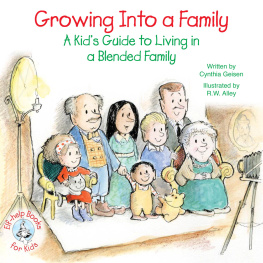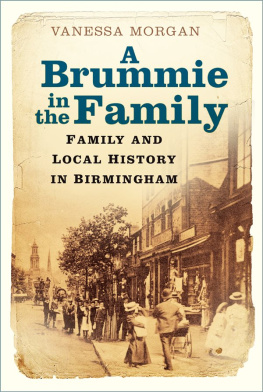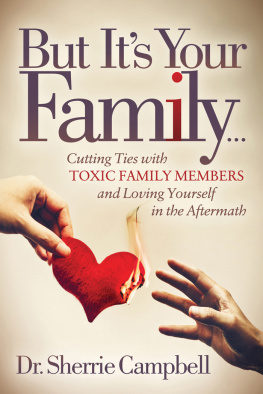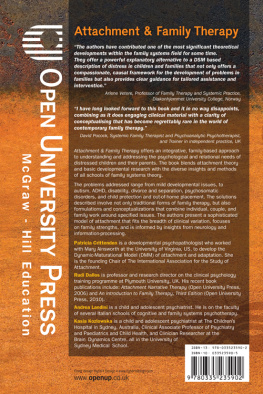The War between the State & the Family
The War between the State & the Family
How Government Divides and Impoverishes
Patricia Morgan
First published 2008 by Transaction Publishers
Published 2017 by Routledge
2 Park Square, Milton Park, Abingdon, Oxon OX14 4RN
711 Third Avenue, New York, NY 10017, USA
Routledge is an imprint of the Taylor & Francis Group, an informa business
Copyright 2008 by Taylor & Francis.
All rights reserved. No part of this book may be reprinted or reproduced or utilised in any form or by any electronic, mechanical, or other means, now known or hereafter invented, including photocopying and recording, or in any information storage or retrieval system, without permission in writing from the publishers.
Notice:
Product or corporate names may be trademarks or registered trademarks, and are used only for identification and explanation without intent to infringe.
Library of Congress Catalog Number: 2008003097
Library of Congress Cataloging-in-Publication Data
Morgan, Patricia M.
The war between the state and the family : how government divides and impoverishes / Patricia Morgan.
p. cm.
Originally published: London : Institute of Economic Affairs, 2007.
Includes bibliographical references.
ISBN 978-1-4128-0754-8
1. Public welfareGreat Britain. 2. Family policyGreat Britain. 3. Great BritainSocial policy. I. Title.
HV248.M58 2008
362.5560941dc22
2008003097
ISBN 13: 978-1-4128-0754-8 (pbk)
CONTENTS
Patricia Morgan has published extensively on crime, the family, adoption and welfare policy over more than twenty years. Her most recent books are Family Structure and Economic Outcomes (2004), for the Economic Research Council, Family Matters: Family Breakdown and Its Consequences (a study in the New Zealand context, 2004) and Family Policies, Family Changes (based on Sweden, Italy and the UK, published in 2006). She is Visiting Fellow at the School of Humanities, Buckingham University.
It has recently become acceptable, indeed fashionable, for politicians to talk about the family. For much of the last twenty years or so, any reference by politicians to the importance of the family would have been greeted by an outcry from the chattering classes complaining that politicians were declaring war on single mothers or undermining non-traditional family lifestyles. Yet it should be possible to have a rational economic debate about the family, as the institution of the family is amenable to rational economic analysis. Families respond to incentives and disincentives put in place by public policy-makers. It is therefore right that family policy should be a subject of discussion among politicians.
The starting point for Patricia Morgans discussion is a presentation of the evidence that the family is an extremely effective vehicle for raising the welfare of its members. Therefore it is quite possible that the state can best support the family by doing very little. That is by providing it with the minimum of explicit support, by not taxing the family heavily and by not subsidising the provision of welfare services to those who choose alternatives to financially self-sustaining family life.
At one level, the family can be seen as a unit within which there is enormous transfer of economic resources between husband and wife, parents and children (in both directions) and, on a wider scale, within extended families. The family is the most important vehicle of welfare and is the welfare vehicle of first resort. Within the family many services are provided by family members to each other, rarely for explicit payment. Basic economic analysis suggests that the family could be seriously undermined if the state provided significant support for dependants who are not being brought up within self-sustaining family units, and if it also provided services, such as childcare, that are generally provided within families. Patricia Morgan shows that this is precisely what has happened in the last 25 years. In the Conservative years the government increased resource transfers to individuals who did not bring up their children within a stable family structure while dragging more and more poor families into the income tax net. In the Labour years the government has been providing, at subsidised rates or free of charge, many of the services such as childcare and long-term care for the elderly that families once provided for themselves. The biggest financial gains are obtained by those who live together but pretend to live apart: fraud appears to be endemic, and this is not surprising given the incentives of large welfare payments that are available.
It could be argued that the driving force of significantly reduced family formation is not economic but social. Social changes have perhaps led to a desire by individuals to bring up children in family circumstances different from those of a generation or two ago. The evidence, however, simply does not support this hypothesis. Internationally, tax and benefit systems are important determinants of family structure. Within the UK, those who are outside the influence of the benefit system, because of the level of their earnings, are much more likely to have and to sustain self-supporting family structures within which to raise children.
Patricia Morgan does not simply analyse the problem, she also suggests policy solutions. The author argues that divorce laws should be reformed to ensure that those who have made commitments should be held financially responsible. What is the point, Patricia Morgan asks, of having a marriage contract if the state then passes statute law that simply allows one party to walk away from their freely entered obligations? Child support obligations should also be strictly enforced. There should also be a reform of means-tested benefits and the tax system. The current situation whereby couples bringing up children together lose entitlement to benefits without any offsetting compensation within the tax system should be ended. This may involve reform of the tax system, reform of the benefits system or both.
The authors argument is all the more compelling because it is backed up with strong evidence and is argued from an unemotional economic perspective. Individuals within families are rational agents who respond to incentives. Welfare policy in the UK, argues Patricia Morgan, has gone wrong precisely because this fact has been ignored by successive governments.
The views expressed in this Hobart Paper are, as in all IEA publications, those of the author and not those of the Institute (which has no corporate view), its managing trustees, Academic Advisory Council members or senior staff.
PHILIP BOOTH
Editorial and Programme Director,
Institute of Economic Affairs
Professor of Insurance and Risk Management,
Sir John Cass Business School, City University
January 2007
The proportion of one-person households in the UK has more than doubled in the last 45 years, with over half of those living alone now being below pension age. Over a similar time period the proportion of births to non-married parents has increased fivefold.
According to the Millennium Cohort Study, the parents of a child are five times more likely to split up in the first three years of a childs life if they are cohabiting than if they are married. They are twelve times more likely to split up if they regard themselves as closely involved than if they are married.

